
An Oregon coho salmon. Environmental groups may sue the state Department of Forestry over logging practices they say harm coho salmon.
Bureau of Land Management/Flickr
A new study suggests that salmon will not be immune to the effects of ocean acidification. Scientists found that changes to ocean chemistry disrupt a fish’s ability to smell danger in the water.
Researcher Chase Williams of the University of Washington exposed young coho salmon to the elevated ocean CO2 levels expected over the next few decades. He then dropped in an odor that normally makes the fish react as if a predator is near. The fish ignored it.
“They’re still smelling odorant, but the way their brain is processing that signal is altered ... Before, they would avoid this predator odor and now they’re more indifferent to it,” Williams said.
The results are concerning because salmon rely on smell to avoid danger, find food and to find their way back to spawning grounds in West Coast rivers.
Co-author Andrew Dittman is a scientist with the federal Northwest Fishery Science Center. He said the results could apply to other salmon species.
“The mechanisms involved … are very similar. So the expectation would be that we would see relatively similar phenomena in the other species as well,” he said.
The ocean absorbs about 25 percent of the carbon dioxide in the atmosphere. The more CO2 humans emit, the more saturated the ocean becomes, thus lowering the pH of the water.
Ocean acidification has already started to have negative effects on the Pacific Northwest’s shellfish industry. Knowledge about potential impacts on other ocean species is still limited.
The study was published in the journal Global Change Biology.
